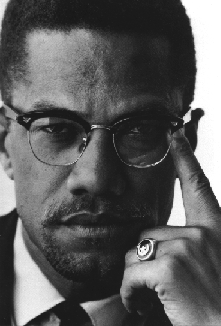Resistance to Police Violence #1: Malcolm X
In light of this article by Michael Ross about the current epidemic of police violence, I thought that it might be a good time for some historical context.
On April 14, 1957, near the intersection of 125th street and Seventh Avenue in Harlem, NY, there was a fight between two black men (in other accounts it was a black man and woman). A crowd had gathered to watch. Several police units arrived on the scene to end the fight. The police officers did what they always did in such circumstances: they began to club people without regard for whether they had been involved in the disturbance or not.
One young man, named Hinton Johnson, reportedly told an officer: “You are not in Alabama. This is New York.” The police officer then clubbed Hinton over the head and cracked his skull. He was knocked unconscious.
 He was taken to the 28th police precinct and soon a crowd began to gather outside. It turned out that Hinton Johnson was a black Muslim known to his fellow congregants as Johnson X. He belonged to Mosque Number Seven, the largest mosque in the U.S. led at the time by a young preacher named Malcolm X. Upon hearing about what had happened to Johnson X, Malcolm arrived at the precinct to serve as a negotiator between the police and the community. The police wanted the crowd that had assembled in front of their precinct to disburse but the crowd refused and started chanting for justice.
He was taken to the 28th police precinct and soon a crowd began to gather outside. It turned out that Hinton Johnson was a black Muslim known to his fellow congregants as Johnson X. He belonged to Mosque Number Seven, the largest mosque in the U.S. led at the time by a young preacher named Malcolm X. Upon hearing about what had happened to Johnson X, Malcolm arrived at the precinct to serve as a negotiator between the police and the community. The police wanted the crowd that had assembled in front of their precinct to disburse but the crowd refused and started chanting for justice.
In his book “The Savage City,” T.J. English writes about what ensued:
A member of the police negotiating team, Walter Arm, the NYPD’s public relations officer, opened the meeting by saying the presence of both the captain of the precinct and a deputy commissioner “indicates how much concern the police department has for this situation. However, I’d like to say that the police in the city of New York can handle any situation that arises in Harlem, and we’re not here to ask anybody’s help.”
The police spokespeople had never heard of Malcolm X. Thirty-one years old at the time, dressed in the Nation of Islam uniform of a bow tie, white shirt, and brown suit, the Muslim leader listened quietly as the police made their statement. Then he looked at the cops, stood up, and proceeded to leave the room.
When the cops realized that their hard-line tactic had failed, they immediately sent a reporter from the Amsterdam News, Harlem’s black newspaper, to find Malcolm X and bring him back to the negotiating table.
When Malcolm returned, he made his position clear. “I have no respect for you or your police department,” he told Walter Arm and the other police representatives. If the police wanted the crowd to disperse, he announced, they must transfer Johnson X to Harlem Hospital at once. The police agreed. After making a series of further demands, Malcolm filled out an incident report that noted that Johnson X had been an innocent bystander who was attacked on account of brute viciousness by city police officers.
Johnson X was escorted out of the station house by a phalanx of Muslims. Then, with a simple hand gesture, Malcolm X motioned the group of protesters to disperse, which they did in an orderly fashion.
“No man should have that much power over that many people,” one police captain reportedly said.
It was the beginning of a new kind of relationship between blacks and the police in the city of New York.
Manning Marable also recounts this story in his excellent biography of Malcolm X released last year titled: “Malcolm: A Life of Reinvention.” The Johnson X incident would help bring Malcolm X to national attention and most importantly to the attention of New York City law enforcement officials.
The episode is dramatized in Spike Lee’s biographical film “Malcolm X” (with some minor license taken for dramatic effect).
I think that it is important for us to find and to highlight these historical moments that underscore people of color’s resistance to police violence over the years. Stay tuned for some information about an exciting new project that I am working on!
